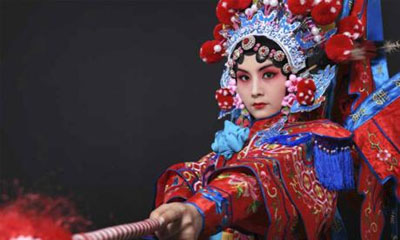 New Delhi:
New Delhi: Music aficionados in the national capital and Mumbai are set for a rare treat when the Chinese opera, "The Peony Pavilion", is performed later in the week, an event made possible by Indian American danseuse Swati Bhise, who has been promoting Indian culture in the United States for close to 30 years.
" 'The Peony Pavilion' is the story of love, youth, and hope. The theme of love is something that connects people and is always universally liked. Also, I felt, this piece was very similar to a lot of stories from our mythology, especially Radha and Krishna, as well as Romeo and Juliet by Shakespeare. Most importantly, 'The Peony Pavilion' shows hope which is something that both the countries need," Bhise told just before heading for India.
The opera will be performed in the Kunqu (pronounced kwin chu) genre, one of the oldest and most refined styles of traditional Chinese theatre performed today. It is a synthesis of drama, opera, ballet, poetry recital and music recital which also draws on earlier forms of Chinese theatrical performances such as mime, farce, acrobatics, ballad recital and medley, some of which go back to the third century BC.
It is listed as one of the Masterpieces of the Oral and Intangible Heritage of Humanity by Unesco since 2001.
Considering that Bhise has for the past four years been organising the Sadir Theatre Festival of plays with music, dance and theatre from all over India in Goa, how did Mumbai (Dec 9) and Delhi (Dec 12) get chosen for the opera's performances?
Noting that "Kunqu opera is an extension of the Sadir Theatre Festival", Bhise said: "As Kunqu is a highly cultivated art form, I did not feel that the Goa audiences would be quite as ready as city audiences to be able to take something as traditional as Kunqu. Therefore, I decided to step out of my comfort zone and narrowed down Bombay (Mumbai) and Delhi to present the opera."
"I chose New Delhi and Mumbai because one is our capital and the other is the New York of India for me. So, they have an outreach and they have an audience. Also, I am from New Delhi; I grew up there and also got roots in Bombay as a Maharashtrian. So, I know these two cities very well and hence I was more comfortable to try and bring this in these two cities," Bhise added.
Bhise has been extensively performing Bharatanatyam in the US and India for over 35 years. Trained by Sonal Mansingh and Kalaimamani Kadirvelu Pillai, she has imbibed the art and created a distinct style of her own. Her performances have been at prestigious institutions such as the National Center for the Performing Arts, Lincoln Center, Asia Society and the Metropolitan Museum of Art.
She was honoured by performing at the 40th anniversary of the United Nations General Assembly and has represented the Indian government in the US several times. She has also worked to support arts in education among youth and contributed to hosting festivals in New York for the past 28 years.
Will 'The Peony Pavilion' be introduced in other cities in the near future?
"I am not bringing it back but maybe I would like to introduce something else. Once, we have seen this, I hope people enjoy and would want to see more of these kinds of performances. Once we have established that connect with audiences, we would like to bring in more of these. There are many beautiful operas out there that the Indian audience is unaware of," Bhise said.
So, how did Bhise become interested in operas?
"I had not seen any western operas till 1982. But when I first went to the United States, I finally saw my first opera, "Carmen". It was deep and moving. Other than this classic, I have also seen contemporary ones like "Porgy and Bess". They were all very different and beautiful each time I saw them.
"Around four years ago when I went to Russia, I got a chance to see "War & Peace". The performance was stunning and the whole experience was simply amazing in itself," Bhise said.
"Since then, every time that I visited a different country, I have tried to see operas in different languages. As the stories were simple and relatable, I never encountered a language barrier. Moreover, the music conveyed a lot and the subtitles were always helpful. I did not interpret every little nuance but overall operas were very beautiful," Bhise added.
Bhise was also upbeat about the manner in which the art and culture scenario is shaping up in India.
"With more and more non-traditional art forms making their headway, the current cultural scenario is shaping up beautifully. Even though different art and cultural forms like modern art, modern dance, modern theatre and fusion are embraced openly, I wanted to revive ancient theatre and ancient art forms which also happen to be my forte. Also, since modern art is something which has taken its roots from traditional art forms, I feel it needs to be highlighted and appreciated," she said.
 New Delhi: Music aficionados in the national capital and Mumbai are set for a rare treat when the Chinese opera, "The Peony Pavilion", is performed later in the week, an event made possible by Indian American danseuse Swati Bhise, who has been promoting Indian culture in the United States for close to 30 years.
New Delhi: Music aficionados in the national capital and Mumbai are set for a rare treat when the Chinese opera, "The Peony Pavilion", is performed later in the week, an event made possible by Indian American danseuse Swati Bhise, who has been promoting Indian culture in the United States for close to 30 years.